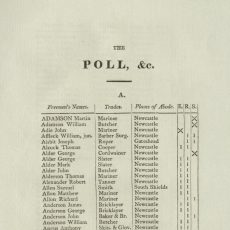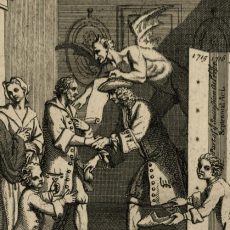Nov
1830
liverpool
Contested
BY ELECTION
In the by-election of Nov 1830, 4435 people voted. There were 2 candidates, with elected.
Poll book data from:
Citation: The poll for the election… (Liverpool: J. Gore, 1830)
Source: John Sims (ed.), A Handlist of British Parliamentary Poll Books (Leicester, 1984); Jeremy Gibson and Colin Rogers (eds.), Poll Books, 1696–1872: A Directory of Holdings in Great Britain (4th edn., Bury, 2008); L. W. L. Edwards (ed.), Catalogue of Directories and Poll Books in the Possession of the Society of Genealogists (4th edn., 1984).
Timeline & Key Statistics
Contexts & Remarks
- A by-election was required in 1830 after one of Liverpool's sitting members, William Huskisson, died in grisly circumstances at the opening of the Liverpool-Manchester Railway. After much political manoeuvring, two candidates emerged who were old schoolmates and political allies (both supported Lord Grey's ministry): William Ewart and John Evelyn Denison. Ewart was elected following a scrutiny by a narrow margin.
- The election was notable for its eyewatering cost of £100,000 and widespread bribery. A copy of the poll book held at the British Library contains annotations detailing more than £22,000 worth of bribes. A different copy, held in the Liverpool Archives, similarly shows thousands of voters receiving payments of between £5 and £40. The scale of corruption was so severe that Liverpool was compared to some of the most notoriously venal boroughs in England (such as East Retford and Evesham), and some feared it would be disenfranchised.
- A petition was submitted by a group of merchants alleging bribery against Ewart, of which a select committee found him guilty, declaring the election void. However, no new writ was issued before the dissolution of parliament.
- The poll book includes a 'List of Unpolled Freemen', implying a total electorate of 5,331, of which 4,436 voted (a turnout of 83%).
- The poll book is prefaced by a 61-page 'History of the Election', which incorporates various papers, addresses, speeches, and other election literature produced during the contest.
- The title page of the copy held at the Liverpool Archives is inscribed 'Henry Holmes', and several voters have been added to the text (and are included in this transcription). It is unclear whether this is the Henry Holmes of Fontenoy Street, shipwright, who appears on p. 34 as voting for William Ewart.
People & Places
Poll Book
Below is a digitised version of the poll book for this election:




